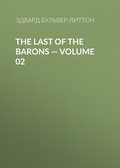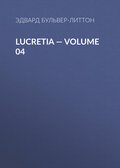
Эдвард Бульвер-Литтон
Pelham — Volume 08
CHAPTER LXXXI
Pectus praeceptis format amicis.
—Horace.
Est quodam prodire tenus, si non datur ultra.
—Horace.
With all my love of enterprise and adventure, I cannot say that I should have particularly chosen the project before me for my evening's amusement, had I been left solely to my own will; but Glanville's situation forbade me to think of self, and so far from shrinking at the danger to which I was about to be exposed, I looked forward with the utmost impatience to the hour of rejoining Jonson.
There was yet a long time upon my hands before five o'clock; and the thought of Ellen left me in no doubt how it should be passed. I went to Berkeley-square; Lady Glanville rose eagerly when I entered the drawing- room.
"Have you seen Reginald?" said she, "or do you know where he has gone to?"
I answered, carelessly, that he had left town for a few days, and, I believed, merely upon a vague excursion, for the benefit of the country air.
"You reassure us," said Lady Glanville; "we have been quite alarmed by Seymour's manner. He appeared so confused when he told us Reginald left town, that I really thought some accident had happened to him."
I sate myself by Ellen, who appeared wholly occupied in the formation of a purse. While I was whispering into her ear words, which brought a thousand blushes to her cheek, Lady Glanville interrupted me, by an exclamation of "Have you seen the papers to-day, Mr. Pelham?" and on my reply in the negative, she pointed to an article in the Morning Herald, which she said had occupied their conjectures all the morning—it ran thus:—
"The evening before last, a person of rank and celebrity, was privately carried before the Magistrate at—. Since then, he has undergone an examination, the nature of which, as well as the name of the individual, is as yet kept a profound secret."
I believe that I have so firm a command over my countenance, that I should not change tint nor muscle, to hear of the greatest calamity that could happen to me. I did not therefore betray a single one of the emotions this paragraph excited within me, but appeared, on the contrary, as much at a loss as Lady Glanville, and wondered and guessed with her, till she remembered my present situation in the family, and left me alone with Ellen.
Why should the tete-a-tete of lovers be so uninteresting to the world— when there is scarcely a being in it who has not loved. The expressions of every other feeling comes home to us all—the expressions of love weary and fatigue us. But the interview of that morning, was far from resembling those which the maxims of love at that early period of its existence would assert. I could not give myself up to happiness which might so soon be disturbed, and though I veiled my anxiety and coldness from Ellen, I felt it as a crime to indulge even the appearance of transport, while Glanville lay alone, and in prison, with the charges of murder yet uncontroverted, and the chances of its doom undiminshed.
The clock had struck four before I left Ellen's, and without returning to my hotel, I threw myself into a hackney coach, and drove to Charlotte- street. The worthy Job received me with his wonted dignity and ease; his lodgings consisted of a first floor, furnished according to all the notions of Bloomsbury elegance—viz. new, glaring Brussels carpeting; convex mirrors, with massy gilt frames, and eagles at the summit; rosewood chairs, with chintz cushions; bright grates, with a flower-pot, cut out of yellow paper, in each; in short, all that especial neatness of upholstering paraphernalia, which Vincent used not inaptly, to designate by the title of "the tea-chest taste." Jonson seemed not a little proud of his apartments—accordingly, I complimented him upon their elegance.
"Under the rose be it spoken," said he, "the landlady, who is a widow, believes me to be an officer on half pay, and thinks I wish to marry her; poor woman, my black locks and green coat have a witchery that surprises even me: who would be a slovenly thief, when there are such advantages in being a smart one?"
"Right, Mr. Jonson!" said I; "but shall I own to you that I am surprised that a gentleman of your talents should stoop to the lower arts of the profession. I always imagined that pickpocketing was a part of your business left only to the plebeian purloiner; now I know, to my cost, that you do not disdain that manual accomplishment."
"Your honour speaks like a judge," answered Job: "the fact is, that I should despise what you rightly designate 'the lower arts of the profession,' if I did not value myself upon giving them a charm, and investing them with a dignity never bestowed upon them before. To give you an idea of the superior dexterity with which I manage my slight of hand, know, that four times I have been in that shop where you saw me borrow the diamond ring, which you now remark upon my little finger; and four times have I brought back some token of my visitations; nay, the shopman is so far from suspecting me, that he has twice favoured me with the piteous tale of the very losses I myself brought upon him; and I make no doubt that I shall hear in a few days, the whole history of the departed diamond, now in my keeping, coupled with your honour's appearance and custom. Allow that it would be a pity to suffer pride to stand in the way of the talents with which Providence has blest me; to scorn the little delicacies of art, which I execute so well, would, in my opinion, be as absurd as for an epic poet to disdain the composition of a perfect epigram, or a consummate musician, the melody of a faultless song."
"Bravo! Mr. Job," said I; "a truly great man, you see, can confer honour upon trifles." More I might have said, but was stopt short by the entrance of the landlady, who was a fine, fair, well dressed, comely woman, of about thirty-nine years and eleven months; or, to speak less precisely, between thirty and forty. She came to announce that dinner was served below. We descended, and found a sumptuous repast of roast beef and fish; this primary course was succeeded by that great dainty with common people—a duck and green peas.
"Upon my word, Mr. Jonson," said I, "you fare like a prince; your weekly expenditure must be pretty considerable for a single gentleman."
"I don't know," answered Jonson, with an air of lordly indifference—"I have never paid my good hostess any coin but compliments, and, in all probability, never shall."
Was there ever a better illustration of Moore's admonition—
'O, ladies, beware of a gay young knight,
After dinner, we remounted to the apartments Job emphatically called his own; and he then proceeded to initiate me in those phrases of the noble language of "Flash," which might best serve my necessities on the approaching occasion. The slang part of my Cambridge education had made me acquainted with some little elementary knowledge, which rendered Jonson's precepts less strange and abstruse. In this lecture, "sweet and holy," the hours passed away till it became time for me to dress. Mr. Jonson then took me into the penetralia of his bed-room. I stumbled against an enormous trunk. On hearing the involuntary anathema this accident conjured up to my lips, Jonson said—"Ah, Sir!—do oblige me by trying to move that box."
I did so, but could not stir it an inch.
"Your honour never saw a jewel box so heavy before, I think," said
Jonson, with a smile.
"A jewel box!" I repeated.
"Yes," returned Jonson—"a jewel box, for it is full of precious stones! When I go away—not a little in my good landlady's books—I shall desire her, very importantly, to take the greatest care of 'my box.' Egad! it would be a treasure to MacAdam: he might pound its flinty contents into a street."
With these words, Mr. Jonson unlocked a wardrobe in the room, and produced a full suit of rusty black.
"There!" said he, with an air of satisfaction—"there! this will be your first step to the pulpit."
I doffed my own attire, and with "some natural sighs," at the deformity of my approaching metamorphosis, I slowly inducted myself in the clerical garments: they were much too wide, and a little too short for me; but Jonson turned me round, as if I were his eldest son, breeched for the first time—and declared, with an emphatical oath, that the clothes fitted me to a hair.
My host next opened a tin dressing box, of large dimensions, from which he took sundry powders, lotions, and paints. Nothing but my extreme friendship for Glanville could ever have supported me through the operation I then underwent. My poor complexion, thought I, with tears in my eyes, it is ruined for ever. To crown all—Jonson robbed me, by four clips of his scissars, of the luxuriant locks which, from the pampered indulgence so long accorded to them, might have rebelled against the new dynasty, which Jonson now elected to the crown. This consisted of a shaggy, but admirably made wig, of a sandy colour. When I was thus completely attired from head to foot, Job displayed me to myself before a full length looking glass.
Had I gazed at the reflection for ever, I should not have recognized either my form or visage. I thought my soul had undergone a real transmigration, and not carried to its new body a particle of the original one. What appeared the most singular was, that I did not seem even to myself at all a ridiculous or outre figure; so admirably had the skill of Mr. Jonson been employed. I overwhelmed him with encomiums, which he took au pied de la lettre. Never, indeed, was there a man so vain of being a rogue.
"But," said I, "why this disguise? Your friends will, probably, be well versed enough in the mysteries of metamorphosis, to see even through your arts; and, as they have never beheld me before, it would very little matter if I went in propria persona."
"True," answered Job, "but you don't reflect that without disguise you may hereafter be recognized; our friends walk in Bond-street, as well as your honour; and, in that case, you might be shot without a second, as the saying is."
"You have convinced me," said I; "and now, before we start, let me say one word further respecting our object. I tell you, fairly, that I think Dawson's written deposition but a secondary point; and, for this reason, should it not be supported by any circumstantial or local evidence, hereafter to be ascertained, it may be quite insufficient fully to acquit Glanville (in spite of all appearances), and criminate the real murderers. If, therefore, it be possible to carry off Dawson, after having secured his confession, we must. I think it right to insist more particularly on this point, as you appeared to me rather averse to it this morning."
"I say ditto to your honour," returned Job; "and you may be sure that I shall do all in my power to effect your object, not only from that love of virtue which is implanted in my mind, when no stronger inducement leads me astray, but from the more worldly reminiscence, that the annuity we have agreed upon is only to be given in case of success—not merely for well meaning attempts. To say that I have no objection to the release of Dawson, would be to deceive your honour; I own that I have; and the objection is, first, my fear lest he should peach respecting other affairs besides the murder of Sir John Tyrrell; and, secondly, my scruples as to appearing to interfere with his escape. Both of these chances expose me to great danger; however, one does not get three hundred a year for washing one's hands, and I must balance the one by the other."
"You are a sensible man, Mr. Job," said I; "and I am sure you will richly earn, and long enjoy your annuity."
As I said this, the watchman beneath our window, called "past eleven," and Jonson, starting up, hastily changed his own gay gear for a more simple dress, and throwing over all a Scotch plaid, gave me a similar one, in which I closely wrapped myself. We descended the stairs softly, and Jonson let us out into the street, by the "open sesame" of a key, which he retained about his person.
CHAPTER LXXXII
Et cantare pares, et respondere parati.
—Virgil.
As we walked on into Tottenham-court-road, where we expected to find a hackney-coach, my companion earnestly and strenuously impressed on my mind, the necessity of implicitly obeying any instructions or hints he might give me in the course of our adventure. "Remember," said he, forcibly, "that the least deviation from them, will not only defeat our object of removing Dawson, but even expose our lives to the most imminent peril." I faithfully promised to conform to the minutest tittle of his instructions.
We came to a stand of coaches. Jonson selected one, and gave the coachman an order; he took care it should not reach my ears. During the half hour we passed in this vehicle, Job examined and reexamined me in my "canting catechism," as he termed it. He expressed himself much pleased with the quickness of my parts, and honoured me with an assurance that in less than three months he would engage to make me as complete a ruffler as ever nailed a swell.
To this gratifying compliment I made the best return in my power.
"You must not suppose," said Jonson—some minutes afterwards, "from our use of this language, that our club consists of the lower order of thieves—quite the contrary: we are a knot of gentlemen adventurers who wear the best clothes, ride the best hacks, frequent the best gaming houses, as well as the genteelest haunts, and sometimes keep the first company in London. We are limited in number: we have nothing in common with ordinary prigs, and should my own little private amusements (as you appropriately term them) be known in the set, I should have a very fair chance of being expelled for ungentlemanlike practices. We rarely condescend to speak "flash" to each other in our ordinary meetings, but we find it necessary, for many shifts to which fortune sometimes drives us. The house you are going this night to visit, is a sort of colony we have established for whatever persons amongst us are in danger of blood- money. [Rewards for the apprehension of thieves.] There they sometimes lie concealed for weeks together, and are at last shipped off for the continent, or enter the world under a new alias. To this refuge of the distressed we also send any of the mess, who, like Dawson, are troubled with qualms of conscience, which are likely to endanger the commonwealth; there they remain, as in a hospital, till death, or a cure, in short, we put the house, like its inmates, to any purposes likely to frustrate our enemies, and serve ourselves. Old Brimstone Bess, to whom I shall introduce you, is, as I before said, the guardian of the place; and the language that respectable lady chiefly indulges in, is the one into which you have just acquired so good an insight. Partly in compliment to her, and partly from inclination, the dialect adopted in her house, is almost entirely "flash;" and you, therefore, perceive the necessity of appearing not utterly ignorant of a tongue, which is not only the language of the country, but one with which no true boy, however high in his profession, is ever unacquainted."
By the time Jonson had finished this speech, the coach stopped—I looked eagerly out—Jonson observed the motion: "We have not got half-way yet, your honour," said he. We left the coach, which Jonson requested me to pay, and walked on.
"Tell me frankly, Sir," said Job, "do you know where you are?"
"Not in the least," replied I, looking wistfully up a long, dull, ill- lighted street.
Job rolled his sinister eye towards me with a searching look, and then turning abruptly to the right, penetrated into a sort of covered lane, or court, which terminated in an alley, that brought us suddenly to a stand of three coaches; one of these Job hailed—we entered it—a secret direction was given, and we drove furiously on, faster than I should think the crazy body of hackney chariot ever drove before. I observed, that we had now entered a part of the town, which was singularly strange to me; the houses were old, and for the most part of the meanest description; we appeared to me to be threading a labyrinth of alleys; once, I imagined that I caught, through a sudden opening, a glimpse of the river, but we passed so rapidly, that my eye might have deceived me. At length we stopped: the coachman was again dismissed, and I again walked onwards, under the guidance, and almost at the mercy of my honest companion.
Jonson did not address me—he was silent and absorbed, and I had therefore full leisure to consider my present situation. Though (thanks to my physical constitution) I am as callous to fear as most men, a few chilling apprehensions, certainly flitted across my mind, when I looked round at the dim and dreary sheds—houses they were not—which were on either side of our path; only here and there, a single lamp shed a sickly light upon the dismal and intersecting lanes (though lane is too lofty a word), through which our footsteps woke a solitary sound. Sometimes this feeble light was altogether withheld, and I could scarcely catch even the outline of my companion's muscular frame. However, he strode on through the darkness, with the mechanical rapidity of one to whom every stone is familiar. I listened eagerly for the sound of the watchman's voice, in vain—that note was never heard in those desolate recesses. My ear drank in nothing but the sound of our own footsteps, or the occasional burst of obscene and unholy merriment from some half-closed hovel, where infamy and vice were holding revels. Now and then, a wretched thing, in the vilest extreme of want, and loathsomeness, and rags, loitered by the unfrequent lamps, and interrupted our progress with solicitations, which made my blood run cold. By degrees even these tokens of life ceased—the last lamp was entirely shut from our view—we were in utter darkness.
"We are near our journey's end now," whispered Jonson
At these words a thousand unwelcome reflections forced themselves voluntarily on my mind: I was about to plunge into the most secret retreat of men whose long habits of villany and desperate abandonment, had hardened into a nature which had scarcely a sympathy with my own; unarmed and defenceless, I was going to penetrate a concealment upon which their lives perhaps depended; what could I anticipate from their vengeance, but the sure hand and the deadly knife, which their self- preservation would more than justify to such lawless reasoners. And who was my companion? One, who literally gloried in the perfection of his nefarious practices; and who, if he had stopped short of the worst enormities, seemed neither to disown the principle upon which they were committed, nor to balance for a moment between his interest and his conscience.
Nor did he attempt to conceal from me the danger to which I was exposed; much as his daring habits of life, and the good fortune which had attended him, must have hardened his nerves, even he, seemed fully sensible of the peril he incurred—a peril certainly considerably less than that which attended my temerity. Bitterly did I repent, as these reflections rapidly passed my mind, my negligence in not providing myself with a single weapon in case of need: the worst pang of death, is the falling without a struggle.
However, it was no moment for the indulgence of fear, it was rather one of those eventful periods which so rarely occur in the monotony of common life, when our minds are sounded to their utmost depths: and energies of which we dreamt not, when at rest in their secret retreats, arise like spirits at the summons of the wizard, and bring to the invoking mind, an unlooked for and preternatural aid.
There was something too in the disposition of my guide, which gave me a confidence in him, not warranted by the occupations of his life; an easy and frank boldness, an ingenuous vanity of abilities, skilfully, though dishonestly exerted, which had nothing of the meanness and mystery of an ordinary villain, and which being equally prominent with the rascality they adorned, prevented the attention from dwelling only upon the darker shades of his character. Besides, I had so closely entwined his interest with my own, that I felt there could be no possible ground either for suspecting him of any deceit towards me, or of omitting any art or exertion which could conduce to our mutual safety or our common end.







